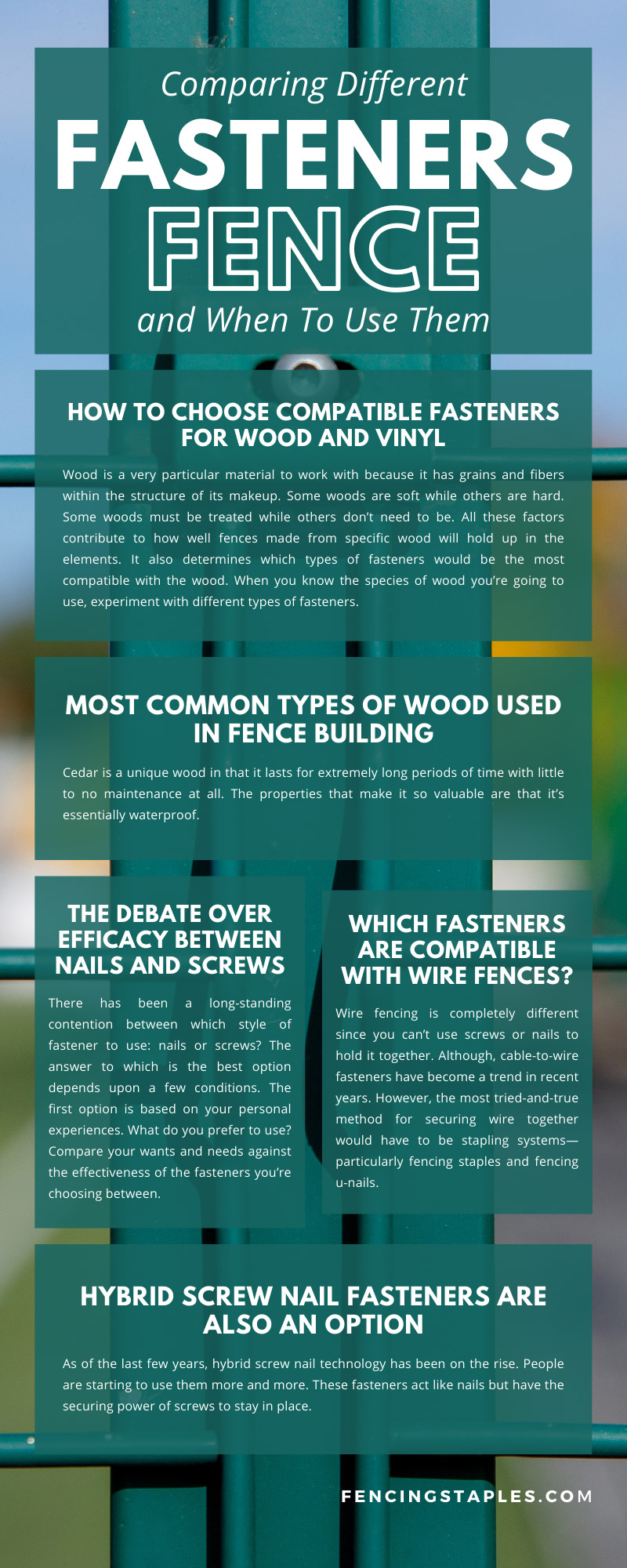No products in the cart.
Comparing different fence fasteners is a useful knowledge. When you’re building a fence, a lot of thought needs to go into the design and structure if you want it to stand firm for a long time. Because all fences are not made the same, they require different techniques when they’re getting erected.
This is why you should know the differences between the tools available for fencing, the types of fencing, how they all come together to form the best possible structure money can buy. Therefore, it’s essential that you begin by comparing different fence fasteners and when to use them so you’ll be prepared for your next project in fence building.
Wood is a very particular material to work with because it has grains and fibers within the structure of its makeup. Some woods are soft while others are hard. Some woods must be treated while others don’t need to be. All these factors contribute to how well fences made from specific wood will hold up in the elements.
It also determines which types of fasteners would be the most compatible with the wood. When you know the species of wood you’re going to use, experiment with different types of fasteners. For instance, vinyl is straightforward since only requires a select type of fasteners, this is a major part when comparing different fence fasteners.
Cedar is a unique wood in that it lasts for extremely long periods of time with little to no maintenance at all. The properties that make it so valuable are that it’s essentially waterproof.
Cedar is known to have acid compounds inside it, which means that when choosing fasteners for your cedar fence, you should only use stainless steel or polymer-coated fasteners. This is because the chemical reaction that happens between the acids in the wood and other corrosion-causing metals can cause the wood to break down.
Compared to cedar, pressure-treated pine is mostly safe to be used with a wide variety of fasteners. However, you should be careful about which type to choose. This is because—whether treated or not— the preservatives on the pine can wear down over time. Alternatively, there might be the chance that the wood will also break down as time goes on.
Through the loss of integrity, some fasteners won’t be a good fit. When you use pressure-treated pine, use stainless steel to ensure that you never have any kind of corrosive issues or rot from your fasteners. You may also go with polymer-coated, silicon bronze, galvanized, or copper fasteners; all of these will give you durability as good as pressure-treated pine. It will be well worth your investment.
Non-pressure-treated pine is a little more delicate. It won’t hold up as long as pressure-treated pine unless you treat the wood yourself after you purchase it. Because you’re working with a softwood, it is not meant to last as long as some of the other available hardwoods.
There has been a long-standing contention between which style of fastener to use: nails or screws? The answer to which is the best option depends upon a few conditions. The first option is based on your personal experiences. What do you prefer to use? Compare your wants and needs against the effectiveness of the fasteners you’re choosing between.
Nails and screws both have unique properties that set them apart and make them great for being used in many different situations. Nails are typically easier to install (especially with pneumatic tools involved.) However, they’re twice as likely to loosen and fall out over time.
Screws don’t have this problem. They were made to strong grip the material they were screwed into and to stay fastened for long stretches of time. They’re great to use when reworking wood projects. Screws are better at holding fencing together than nails.
Wire fencing is completely different since you can’t use screws or nails to hold it together. Although, cable-to-wire fasteners have become a trend in recent years. However, the most tried-and-true method for securing wire together would have to be stapling systems—particularly fencing staples, fencing u-nails or Cat’s Claw fencing staples.
When you’re building wire fencing with steel post structures, steel post clips work best. But if you want to have a cattle farm (or perhaps already have one) and want to use wooden posts, then go with u-nails, staples or Cat’s Claw fencing staples.
As of the last few years, hybrid screw nail technology has been on the rise. People are starting to use them more and more. These fasteners act like nails but have the securing power of screws to stay in place.
They can be used by virtually any fencing option out there—but they must have something to latch to. So, if you have wire fences that need fastening, there needs to be a post of some kind so you can attach the fastener.
So, when you are comparing different fence fasteners and knowing when to use them, there are a few conditions that must be understood before you make any rash decisions. Knowing your materials and how they all interact with one another is most important.
If you go into a fencing project without this knowledge, you might as well just do the project with no rhyme or reason. It’s good to be aware of your fasteners and all the ways you can use them—especially when you have the compatible materials at hand.
Ultimately, when you do a fencing project, the materials and fasteners you use are up to you. These are just a few tips to help you get started on your fence-building journey.

We hope this blog has helped. Have any other questions about the different fence fasteners? Send them over to the Head Cat Collector at ra***@***************rs.com and don’t forget to check us out on Facebook, Instagram, Youtube , and Pinterest. And make sure to read Cat’s Claw Fasteners other blogs here!
Read Next: Building Your Fence: 5 Things to Know Before You Start
